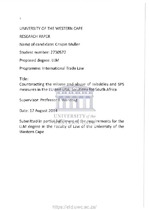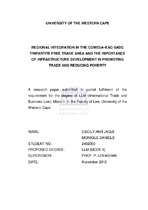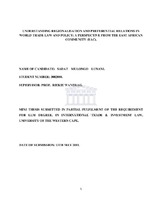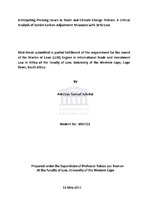Counteracting the misuse and abuse of subsidies and SPS measures in the EU and USA: Solutions for South Africa
Abstract
It has been held that agricultural domestic support would not be such a contentious issue if its only effect was the benefit of local farmers, but this is not the case.1 It was found that several forms of domestic support have the effect of distorting the patterns of agricultural production and trade at an international level, leaving non-supported farmers elsewhere worse off.2 It was thus concluded that such support measures may indeed nullify the benefits which accrue from trade liberalisation and explains how the AoA3 regulates these measures in a way that reduces their trade distorting effects.4 It has been noted that the agricultural sector only accounted for a small percentage of the
developed world's Gross Domestic Product {GDP}, yet the regulation of international agricultural trade was not an easy task.5 Smith explains that numerous attempts were made to implement some form of regulation, including a half-hearted effort in the General Agreement on Tariffs and Trade (GATT) and the subsequent AoA upon the creation of the WTO in 1995.6 According to Smith, the successful regulation of international agricultural trade remained elusive, despite Desta MG and McMahon JA explain that the WTO is not very concerned with countries that provide domestic support to their agricultural sectors, as this only matters to the extent that it hopes for liberalising trade in the sector.7 affects trade in that sector.8 It is further observed that the AoA balances out the freedom to provide domestic support with the need to reduce or eliminate the trade distortive effects thereof and note that the AoA has essentially made all forms of domestic support more transparent and easier to deal with.9 A party is therefore unlikely to be challenged, successfully, if domestic support is given in accordance with the provisions of the AoA.10 The aforementioned views only seem to address the merits of the AoA and the way in which it
regulates the use of agricultural subsidies. It should however be noted that the literature fails to address the fact that the WTO has not enforced the provisions of the AoA very effectively against the EU and the USA, in light of the continued misuse of subsidies within both parties. In this regard it must be ascertained whether the WTO should impose stricter penalties as a means to deter its member states, especially the EU and USA, from using subsidies in an abusive way. In addition to this, it must be determined which types of penalties can and should be imposed.
Collections
Related items
Showing items related by title, author, creator and subject.
-
Regional integration in the COMESA-EAC-SADC Tripartite Free Trade Area and the importance of infrastructure development in promoting trade and reducing poverty
Daniels, Cecily-Ann Jaqui Monique (University of the Western Cape, 2012) -
Understanding regionalisation and preferential relations in world trade law and policy: a perspective from the East African Community (EAC).
Lunani, Sadat Mulongo (University of the Western Cape, 2011)The rapid growth in the number of regional trade agreements (RTAs) has led to concern about the weakening of the multilateral trading system. This thesis examines the spread of such agreement and the extent to which they ...




